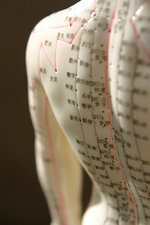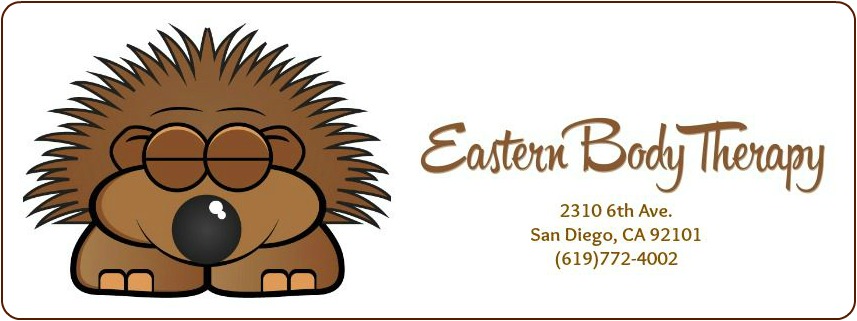
- Will acupuncture hurt?
- What is the difference between acupuncture, acupressure, and electro-acupuncture?
- Can I catch anything from being treated?
- How often do needles get broken or stuck?
- Are herbs harmful to my liver?
- Can I take herbs with my medications?
- What is a QME?
- How long do I need to come for treatment?
- How long does a treatment last?
- My doctor is concerned about whether acupuncture is appropriate for me...
- Can I use my insurance?
Although most people do not find acupuncture painful, it is not without sensation. Unfamiliar sensations are often interpreted as pain, although patients who find the first session "painful" usually find that as the sensations become more familiar and they are no longer fearful that pain is no longer the appropriate word to describe what they are feeling. Generally, needle insertions are experienced as a sensation of pressure against the skin. On particularly sensitive points, there may be sensation like a pinch or a mosquito bite. When the needle connects with the qi and is in the appropriate location, patients tend to experience either a strange electrical-like sensation traveling down the channel or a dull, heavy aching sensation similar to the feeling when your foot falls asleep, after the pins and needles stage. back to top
Acupuncture is the insertion of needles at specific points on the body. Acupressure uses the same points, but stimulates them with pressure rather than with needles. The effects are not as deep or as long lasting as acupuncture. Electro-acupuncture either uses electricity to stimulate the acupuncture points or uses electricity on the needles to maintain constant stimulation of the point during the treatment. When used in conjunction with needles, it is a stronger treatment than acupuncture alone. Stronger in this case means more sensation at the points treated during the treatment, and longer lasting results for some patients. Electroacupuncture may be too strong a treatment for weaker patients, children, and seniors. back to top
Most of the risk of disease resulting from acupuncture is related to inadequately sterilized and inappropriately stored reusable needles. In the United States, it is standard practice to use single use, sterilely packaged, disposable needles. As of 8/22/2005, disposable needles are legally REQUIRED in the State of California. If your practitioner uses disposable needles and disposes of them properly after use, it is very unlikely that you will “catch” anything as a result of your acupuncture treatment. For your protection and in compliance with State law, Eastern Body Therapy uses ONLY single use, disposable needles which are sterilely packaged. back to top
With single use needles, it is extremely rare for a needle to be broken during a treatment. Repeated sterilization of needles tends to weaken the structure of the metal, which is why broken needles were more common prior to single use needles became the norm. It is possible for a needle to break if the patient moves around a lot while the needles are in deeper muscle tissue or if a patient has a muscle spasm while the needles are in. However, the needles used are very small, very flexible, and generally do not break with ease. Stuck needles are more common than broken needles, but this also is a rare occurrence. Generally, when a needle appears stuck, the body just isn't ready to let go of it yet. Waiting 5 minutes or so and coming back to it is usually all that is needed for that stuck needle to lift right out with ease. In some cases where the patient has particularly tight muscles or has moved during the treatment, muscle fibers get wrapped around the needle making it more difficult to remove. This is easily fixed by massaging a point near the stuck needle or inserting a needle a point or two down the channel to loosen the qi in that area. back to top
Herbs are powerful substances, which can have far reaching effects on the body. Many patients feel that because herbs are natural substances, they can use as much as they want, in any combination they see fit. This can be dangerous - hemlock is an herb! When herbs are treated with respect and used appropriately, they are as safe as medications, and often have fewer side effects. They also tend to be slower acting because they are less refined than pharmaceutical substances. Yes, it is possible for herbs to harm your liver. However, if you are working with a skilled herbalist, formulas will be developed in such a way that the toxic properties of the stronger herbs are tempered by other ingredients in the formula. With the correct identification, preparation and combinations of herbs, most formulas are very safe and have few if any side effects. The most common side effects you may see with Chinese herbal formulas are changes in bowel function. Some people will find that they have more frequent bowel movements while others will find that they become mildly constipated from their formulas. These effects are easily corrected, so make sure your herbalist knows about any adverse reactions you experience. In very rare occasions, a person may be allergic to an herb. Allergic reactions to internal formulas tend to by systemic and may include rash, itchiness, or in severe cases shortness of breath. If you experience any of these, stop taking the herbs immediately and contact your practitioner. You may need biomedical treatment if the reaction is severe. back to top
There are many schools of thought regarding this question. Most medical doctors will discourage taking herbs in conjunction with medications, and some Chinese Medicine practitioners discourage taking medications if you are using herbal formulas. The fact is, most patients who seek out practitioners of Chinese Medicine are also under the care of a physician, and are taking multiple medications. It is really a matter of opinion whether it is safe to combine the two. In general, it is not a good idea to take herbs for the same conditions you take medications for. If you are taking high blood pressure medication, adding herbs to lower the blood pressure may lead to a negative interaction. However, if your practitioner recommends herbs to descend your liver yang due to symptoms of headache, irritability, dizziness and wiry pulse, it is probably safe to take the formula along with your blood pressure medications. What you may find is that the next time you see your doctor, your blood pressure is low enough to reduce the medications! There are some combinations of herbs and medications which should be avoided as they can decrease or increase the effectiveness of one another. If you are taking medications whether prescription, over the counter, or nutritional supplements, make sure you tell your Chinese medical practitioner so that she can make sure any herbs recommended will not interact adversely with your other medications. back to top
QME stands for Qualified Medical Evaluator. It is a term which is only relevant in the California Worker's Compensation system. A QME is someone who is hired by an injured worker or an insurance company to perform an independent examination of an injured worker for the purpose of resolving a dispute between the worker and the insurance carrier/employer. Disputes may be about whether an injury is or is not the result of employment, whether treatment being requested is appropriate for the injury, whether the patient has reached the maximum benefit from available treatment, whether or not it is time for the worker to return to work, and a variety of other issues. The QME reviews all of the medical records provided for the worker, completes an examination of the worker, and writes a report answering the questions to resolve the dispute. Someone who is a QME has learned enough about the California Worker's Compensation system to understand the legal as well as medical issues relating to treatment of work related injuries. Physicians (including acupuncturists) must pass a state examination and participate in ongoing training in order to become and remain a QME. back to top
The answer to this depends on your condition. For most people with an acute condition, a course of treatment is a series of 10-12 visits. They may be 2-3 times per week for a month, once per week for 3 months, or something completely different based on your specific needs. Usually, there is a period of more frequent treatment over a week or two, then a gradual reduction in frequency as the body recovers. Patients are encouraged to fully participate in any physical therapy or other western treatment that has been recommended while receiving their acupuncture treatment.
For people with more chronic conditions (say arthritis or hepatitis C or menopausal disorders), treatment is often ongoing, and may continue indefinitely. The goal is to find the frequency of treatment where the symptoms are under control to the greatest degree possible, and this will vary from patient to patient. For some people this is once per week, for others once per month or even less frequently. Treatment plans are individually tailored and revised as necessary to meet the needs of both the body and the budget. back to top
Most acupuncture treatments last about an hour. Lisa usually spends at least 45 minutes on an initial evaluation, so the first visit will be about 90 minutes including evaluation and treatment. back to top
There is a growing body of research demonstrating the efficacy of acupuncture for a variety of conditions. Lisa has been involved with a research task force which has been developing evidence-based guidelines for acupuncture treatment for musculoskeletal conditions. It is very unlikely that acupuncture will make your condition worse, and quite likely that it will be helpful. We are happy to provide information about the research supporting our treatment decisions were it is available. back to top
Many insurance plans do provide coverage for acupuncture, typically paying 60-80% of the “usual and customary” cost of the services up to a maximum of $500 or 12 visits per year. Individual coverage varies widely, and we encourage you to talk to your insurance company about your particular plan’s coverage. Eastern Body Therapy does not participate in any preferred provider networks (PPO), nor are we participating providers in any of the HMO plans. Because we work without billing staff, we are unable to verify your coverage, or accept payment directly from your insurance company. We ask for your cooperation in providing full payment at the time of your visits. We are happy to send a HCFA form to your insurance company as a courtesy, and will provide any documentation required for you to be reimbursed by your insurance company if you do have coverage. If you are on Worker’s Compensation we require pre-authorization in writing from your insurance company before we will provide treatment. In this case, services will be billed directly to your insurance company as required by California State Law. back to top
|

 Yelp About Us
Yelp About Us 
